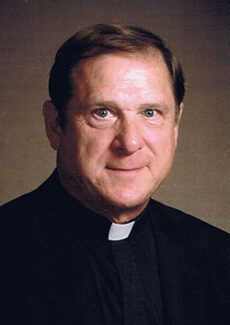Conversion to Christ is a Divine gift

Father R. Michael Schaab
By Father R. Michael Schaab
Sixth Sunday of Easter/May 9
Acts 10:25-26,34-35,44-48; Psalm 98:1,2-3,3-4; 1 John 4:7-10; John 15:9-17
All the readings chosen for this Sunday reinforce the fundamental principle that in matters of faith, first God acts and then we freely respond. Even in conversion, first God gives a person the grace needed to convert, and then the person is able actually to convert. For those newly baptized Christians who listen to this instruction during the Easter season the message is clear. Their conversion to follow Christ is not merely of their own doing. It is a Divine gift that they have received and are to cherish. A gift freely given and to freely be received. This is a lesson that all Christians learn over and over again throughout life.
The first reading from the Acts of the Apostles demonstrates this principle. Peter is in the house of Cornelius, a Roman centurion stationed in Caesarea. He is speaking not to fellow Jews but to Gentiles who in the early Church were expected to first convert to Judaism before they could become Christian. But as he speaks the Spirit fills the hearts of his listeners, and Peter recognizes what must be done. He says, “Can anyone withhold the water for baptizing these people, who have received the Holy Spirit even as we have?” So, these Gentiles are baptized and become Christians without first converting to Judaism.
Peter realized God’s activity in the hearts of those Gentiles, and he responded with baptism. Sometimes God’s activity goes contrary to the conventional wisdom of the believing community. Those are times when everyone is reminded of just who is in charge. As it says in today’s Gospel according to John, “You did not choose me, no, I chose you.” Such times are a reminder, also, that God’s ways are not always our ways.
A PARTICIPATION IN GOD’S PLAN
In the second reading from the First Letter of John, John writes that what is most important is “not that we have loved God, but that he loved us.” This illustrates another dimension of the principle that first God acts and then we respond, and that is our free response is really a participation in God’s activity. We are able to love because we have first been loved by God. As Jesus states in the Gospel, “Love one another, as I have loved you.”
While our response to God’s activity is free, there is a sense of obligation. God’s activity is often a command, but not one requiring blind obedience as if given to a slave. For the believer, even in times when it might not be fully understood, the command is seen as a participation in the plan of God. As it says in the Gospel, “I no longer call you slaves, because a slave does not know what his master is doing. I have called you friends, because I have told you everything I have heard from my Father.
Our free response is really a participation in God’s activity. We are able to love because we have first been loved by God.
Friends of Christ have received a special command — an appointment. “You did not choose me, no, I chose you and appointed you to go and bear fruit that will remain.” They have also received a special promise. “Remain in my love . . . so that whatever you ask the Father in my name he may give you.” This appointment and promise give us the wherewithal even “to lay down one’s life for one’s friends.”
As all the implications of the Savior’s command to love one another are explained to them, the newly baptized might be overwhelmed by what must seem to be an impossible task. But they receive the assurance of the Holy Spirit remaining with them to fulfill the command. And even more than that, they are told that this new life they are to live will be a source of joy for them. “I have told you this so that my joy may be in you and your joy may be complete.” And it is that joy that connects them and us back to the house of Cornelius where the Spirit filled the Gentiles. Filled with that same Holy Spirit and in the words of the Responsorial Psalm, let us “Sing joyfully to the Lord, all you lands; break into song; sing praise.”
—
FATHER R. MICHAEL SCHAAB is a senior priest of the Diocese of Peoria who gives retreats and days of recollection, and who fills in as presider at parish Masses on weekends. He resides on a hobby farm in Putnam County.





